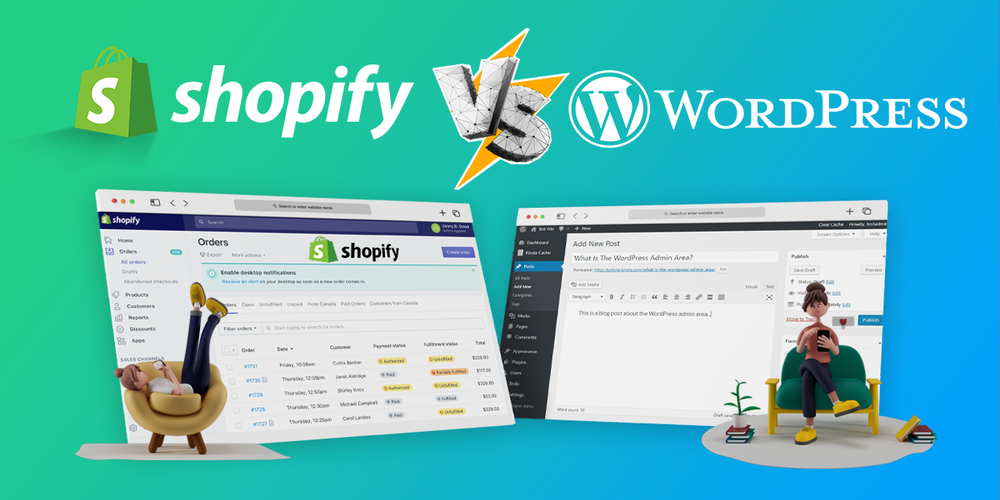Shopify Vs WordPress: Which Is Best For Your Online Store In 2022
E-commerce | 13-09-2022 | Jennifer Simon

Most businesses now work on a hybrid model - brick-and-mortar stores and eCommerce websites. A physical store or digital brand needs additional software to efficiently manage various backend functions - order management, accounts, customer services, and inventory management. However, when likened to a physical store, an eCommerce platform is the more robust pillar that defines the success of an online store.
Hence it is essential to choose a reliable eCommerce platform to manage an online store. When choosing the right eCommerce platform, it is necessary to consider eclectic factors, including pricing, user-friendliness, budget, and maintenance. While several eCommerce platforms are available, Shopify and WordPress remain the market leaders. But store owners are still quite confused when picking between these two.
To make the selection easier for you, we thought to list the significant difference between Shopify and WordPress. We hope this comparison will help you determine the right platform for your business needs.
So let us dig into the details!
What's the Difference between Shopify and WordPress?
Shopify, the most popular eCommerce platform in the world, is an all-in-one online store creator, assisting you in creating a full-fledged online store quickly. A wide range of themes and templates make it a perfect choice. Shopify claims, "You don't need to have any technical or design experience to easily create a beautiful online store." The platform supports a wide range of cards and is known for high-end security. It is a fully responsive platform and helps you sell anywhere fast.
WordPress is a content management system CMS that helps you host and create websites. It's a well-liked tool for people who wish to develop websites and blogs but have no coding skills. There is no fee for the software. It is free for anyone to install, use, and change.
Shopify vs WordPress: An Overview
Shopify enables startups and small businesses to create, operate, and manage an online store easily.
Shopify comes with all the tools you need to sell products, including:
- Tools for quickly designing an online store
- Integrated payments with Shopify Payments
- Printing shipping labels with built-in shipping savings
- Tools for managing collections, product data, and inventory
- Integrations for print-on-demand and drop-ship companies
- Selling on Amazon and eBay through a multichannel platform
- Instagram and Facebook Shops provide social selling
- Facebook ads, email marketing, and abandoned cart recovery are all included marketing options
- Use Shopify POS for in-person and in-store sales
- Setup assistance or problem-solving support around the clock
The WordPress platform is known for its versatility. WordPress enables you to create a content-based website with pages, images, videos, and blog posts. Installing different' plugins' gives any WordPress website additional functionality as required. When you use an eCommerce plugin in conjunction with WordPress, you can accomplish a tonne of things, some of which are listed below:
- You can use an influential, feature-rich, single-user, or multi-contributor blog to create an online store
- An online business should include elements that increase traffic, such as online forums and video channels
- Publish products directly on your blog and enable blog-based commerce
- Convert any WordPress blog or website into an online store
- Combine physical goods sales and affiliate revenue on a single website
- Sell both shipped physical goods and download-only digital products
- Sell goods via drop shippers and print-on-demand manufacturers
- Sell memberships or access to a learning portal or exclusive content
Let's compare both platforms below based on their salient features, including pricing, setup, eCommerce tools, and support, so you can decide which eCommerce solution is best for you.
Shopify
Pricing: $29 per month, $79 per month, and $299 per month
Setup: Simple, easily customizable and responsive
eCommerce Tools: Built-in features and lists hundreds of integrations to augment your site
Support: 24/7 support for access for members
WordPress
Pricing: Ranges from around $10 to hundreds per month
Setup: Greater flexibility
eCommerce Tools: Required to add functionality with plugins
Support: Active support community
Shopify vs. WordPress: eCommerce
Shopify is easy-to-manage and simplifies the tasks like orders, inventory, payments, and shipping from a single dashboard. The platform is easily scalable and provides enterprise-level support. It has over 100 payment gateways, and its built-in gateway, Shopify Payments, is free of cost. It also has built-in marketing tools and provides store insights vital for marketing campaigns. It has most of the essential SEO features online retailers require and covers SEO practices like structure, on-page optimization, and other ranking aspects. The platform offers 24/7 customer support.
WordPress is the favorite platform for bloggers and businesses. It is an open-source platform, easy to modify and use. It is SEO-friendly and helps boost rankings. It provides creative freedom for users and is highly secure. The platform offers several security measures, such as switching inactive users and enabling two-factor authentication. It doesn't provide in-person support but has a large community supporting its users. However, hiring a WordPress developer when planning to create a store is always better, as it gives you enough confidence to develop a store the way you want!
Shopify vs. WordPress: Performance and Security
Shopify is a dedicated, hands-off simple eCommerce solution with outstanding and reliable performance. It keeps 100% SSL to maintain site sleep. The platform ensures hack-proof and hires cybersecurity professionals to guarantee the same. On the other hand, WordPress is more flexible. It doesn't restrict product listing and provides easier content and marketing management tools. It is highly responsive and super-fast, delivering unprecedented cybersecurity.
Shopify vs. WordPress: SEO
Shopify SEO services is a compilation of SEO modifications specific to the Shopify platform. While Shopify stores include a blog and the ability to redirect, these features can potentially lead to SEO problems like duplicate content. Pros of Shopify SEO include fast loading time, which is a major Google ranking factor. It comes with top-level SSL encryption and improving SEO security. Its built-in mobile optimization produces XML sitemaps, allowing customers to customize essential SEO data such as META and title descriptions. It also provides a range of SEO applications, optimized CSS & HTML5 coding.
WordPress is a self-hosting platform with the WooCommerce free plugin. Users of this platform can build a highly configurable eCommerce store. Although the platform and the WooCommerce plugin are free, you must purchase a license from independent app developers for most features. The trade-off is that website owners can customize their stores to a great extent, especially regarding SEO.
WordPress has functional SEO capabilities and is up-to-date, making it more secure and efficient. It also has search engine-friendly URLs and provides full Yoast SEO plugin access. It also offers rich snippet support, which gives better Google search results.
Which is superior, WordPress and Shopify SEO?
Choosing one is subjective and challenging as it depends on your business requirements. The platform you select will depend on your level of technical expertise as both have significant advantages and cons.
If you want an easy-to-use platform for SEO elements, go for Shopify. Minimal customization is sufficient to make your store functional.
If you want a powerful WordPress CMS and a high level of adaptability and usability, choose WordPress. You'll have much more SEO control at your disposal, but it will take more effort and a steeper learning curve.
To Conclude:
Shopify is a 'website builder.' We must first comprehend what a website builder is to understand what Shopify is. A website builder is an online tool that enables users with little to no technical experience to create their websites. The website builder platform charges them a monthly fee to maintain their site. Since Shopify is designed exclusively for eCommerce (as opposed to blogs or online resumes), it is only ever used to create online businesses.
Shopify doesn't have a free version, but five plans are available in the market. It offers a 14-day free trial, and the basic plan is Basic Shopify which is the right choice for startups. The second plan is Shopify, and the third one, Advanced Shopify, is for growing businesses with multiple stores. Next comes Shopify Plus, a perfect option for large eCommerce enterprises. Shopify Lite allows customers to turn any website into an online store. Though Shopify looks expensive, it is specialized in eCommerce and will be able to leverage your business opportunities.
We recommend Shopify if:
- Your technical knowledge is limited
- You are not choosing a solution provider
- Require a cost-effective platform
- Convenience is your priority
WordPress is unique, and, WordPress.com and WordPress.org are the two versions available. You can quickly make your website using WordPress.com, a blogging platform that functions similar to a website builder. WordPress.org is a self-hosted software with a far higher level of technological sophistication.
We Recommend WordPress if:
- You have prior knowledge of coding
- You have control over your site's customization
WordPress allows users to develop an essential website freely. You should entrust WooCommerce plugin development with an expert developer. There are four different plans available. The first plan is the personal plan, and then comes the WordPress Premium plan, which is an ideal choice for freelancers. WordPress Business is the third plan, the right choice for small businesses, and the final plan is WordPress eCommerce, a perfect solution for large-scale enterprises.


.jpg)

.jpg)
.jpg)
.jpg)
.jpg)
.jpg)

